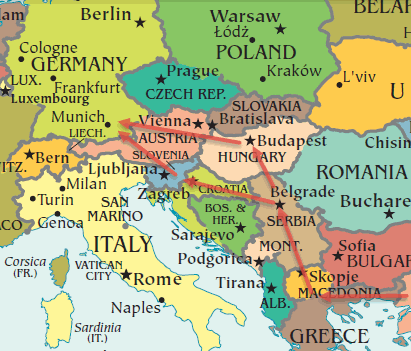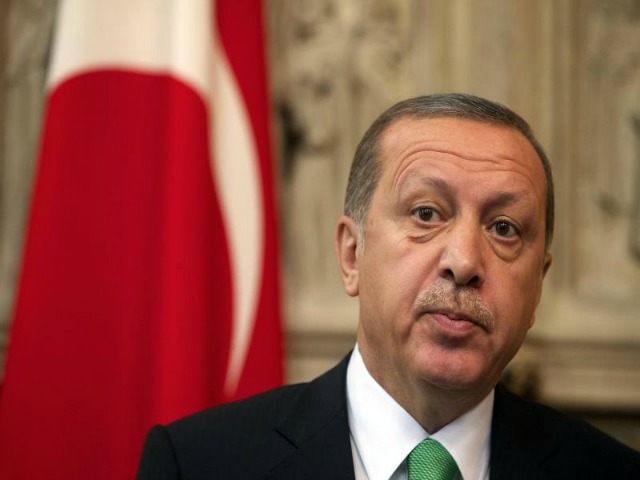This morning’s key headlines from GenerationalDynamics.com
- Russian troops may take control of Tajikistan’s border with Afghanistan
- European Union agrees to terms in exchange for Turkey’s help with refugees
- Hungary closes the border with Croatia
- Polls show British voters more willing to leave European Union
- Turkey’s president Erdogan ridicules Europe over refugee crisis
Russian troops may take control of Tajikistan’s border with Afghanistan

Russian soldiers at the junction of three state borders: Tajikistan, Uzbekistan and Afghanistan (Ria Novosti)
Two weeks ago we reported “29-Sep-15 World View — Afghan Taliban capture of Kunduz has major repercussions for Central Asia”. Those repercussions are increasingly being felt in Tajikistan, the large Central Asian country along the northern border with Afghanistan, as Russia appears poised to send troops to take control of the border from Tajikistan soil.
Central Asian countries are increasingly concerned by the rise of the so-called Islamic State (IS or ISIS or ISIL or Daesh), and its possible spread into southern and central Asia. Although some formerly al-Qaeda linked groups have switched their allegiance from al-Qaeda leader Ayman al-Zawahiri to ISIS leader Abu Omar al-Baghdadi, ISIS is not the principal threat in Afghanistan, Pakistan or Central Asia, as it has in Syria and Iraq. Nonetheless, there seems to be a widespread fear that the growth of ISIS has energized all Sunni jihadist groups, including the Taliban and the Islamic Movement of Uzbekistan (IMU). Russia estimates that there are about 3,000 ISIS fighters and about 30,000 Taliban fighters in Afghanistan.
In a statement on Friday, Tajikistan President Emomali Rahmon expressed concern about the rise of ISIS in the region, and called on former Soviet republics to step up their cooperation against ISIS:
Taking into account the unstable situation in the world, aggravating regional conflicts in the world, we have an opportunity to discuss these problems and find solutions, including regarding the fight against the Islamic State and other international terrorist organizations, in the Commonwealth.
Russia had a special unit of border guards at the Tajikistan-Afghanistan border between 1992 and 2005 and repeatedly repelled attacks by Taliban forces. Russia has a military base in Tajikistan, but its servicemen do not participate in protecting the country’s borders. Russia Today and Reuters and Belarus News
European Union agrees to terms in exchange for Turkey’s help with refugees
European Union leaders meeting in Brussels on Friday have agreed to ease visa restrictions for Turkish citizens and accelerate negotiations over Turkey’s membership in the EU in exchange for Turkey’s help in slowing the flow of migrants from Iraq, Syria and Afghanistan traveling through Turkey to reach the EU.
Turkey has requested 3 billion euros in funding to help the country deal with the migration crisis. This was not part of the Brussels agreement, but German Chancellor Angela Merkel said that it would be considered.
Turkey’s Foreign Minister Feridun Sinirlioglu was harshly critical of the offer, calling it “unacceptable” and “insignificant.” According to Sinirlioglu:
There is a financial package proposed by the EU and we told them it is unacceptable. …
If (the EU) delivers 3 billion euros ($3.4bn) in the initial phase, it would be meaningful. We (Turkey) have spent $8 billion (on refugees) and our gross national product is around $800 billion. Their (GNP) is $18 trillion.
Three billion euro versus $18 trillion (GNP) is comic but it is much better than the $500 million that they had delivered.”
Sinirlioglu rejected any “bargaining” with the EU, saying: “The aid to be delivered will not be for Turkey but to support Syrians in desperation.”
Merkel will visit Erdogan in Istanbul over the weekend to discuss the refugee crisis. Irish Times and Reuters and Al-Jazeera
Hungary closes the border with Croatia

Migrants arrive from Turkey to Greece, through Macedonia and Serbia, then proceed from there depending on which borders are still open.
In another blow to the European Union’s prized open-border Schengen Agreement, Hungary closed the border with Croatia on Friday at midnight.
The flood of migrants from Turkey into Europe with Germany as a desired destination has not slowed appreciably with the approach of winter. In fact, the flood has increased considerably in the last few days, as word spread that there was little time left to reach Croatia before Hungary closes the border.
Migrants have been arriving in the islands of Greece in the Aegean Sea, where a Greek ferry transports them to the mainland. From there they travely to Macedonia, then north through Serbia. They used to continue on through Hungary to Austria and Germany, but Hungary closed the border with Serbia several weeks ago. Since then, they turned westward and traveled through Croatia and then into either Hungary or Slovenia. Now, with Hungary’s closure of the border with Croatia, they all be directed to travel through Slovenia.
Hungary’s prime minister Viktor Orbán criticized the agreements being made in Brussels as inadequate, because it did nothing to stop the flow of migrants from Greece. According to Orbán:
The agreement with Turkey has not been finalized yet, but we have given the mandate to complete the task. Until then, however, the Greek border should have been closed, which would bring relief to Macedonia, Serbia, Hungary and Croatia. However, there is no power, determination and political will to do that.
A group of several hundred migrants who arrived minutes before the Friday midnight deadline were the last to be allowed through. It is now Slovenia’s turn to fear being overwhelmed by migrants. Portfolio (Hungary) and Total Croatia News and BBC
Polls show British voters more willing to leave European Union
According to a September 28 YouGov poll, 40% of Britons now say they want to leave the European Union (“Brexit”) versus 38% who say that they want to stay. The UK will hold a referendum on Brexit some time in the next two years. There are two major issues that have substantially boosted the pro-Brexit vote.
One issue has to do with the flood of migrants arriving in Europe, but that’s not the principal reason.
The principal reason has to do with Greece’s financial crisis. The crisis in Greece itself is also not the main issue on U.K. voters’ minds, but rather how Athens was treated by Germany and the rest of the euro zone that has struck home. The negotiations painted the EU and its biggest economic power as controlling and unforgiving.
What both issues have in common is the sovereignty. Britain’s prime minister David Cameron says that he is in favor of Britain remaining in the EU, but only if there are some changes. Cameron has listed four main issues:
- Removing the goal of “ever closer union” from EU treaties to keep Britain out of a superstate;
- an explicit declaration that the EU is a “multi-currency” union so that Britain can keep the pound currency;
- a return of some sovereignty to national parliaments so they can veto Brussels’ directives and scrap some existing rules;
- a restructuring of the bloc so that eurozone countries cannot impose their will on the noneuro countries.
The polls show that the British voters are changing their minds, and may be deciding that whether or not the EU needs Britain, Britain no longer needs the European Union. Market Watch and CNBC
Turkey’s president Erdogan ridicules Europe over refugee crisis
Turkey’s president Recep Tayyip Erdogan on Friday took note of the fact that Germany’s Chancellor Angela Merkel was on the list to receive the Nobel Peace Prize:
“Someone comes out and says they’ll accept 30,000, 40,000 refugees and they’re shown as a candidate for the Nobel Prize somehow. We’ve got 2.5 million refugees and nobody cares.”
Actually, hundreds of thousands of refugees are expected to arrive in Germany this year.
Merkel will visit Erdogan in Istanbul over the weekend to plead for Turkey’s help is slowing the flow of migrants from Iraq, Syria and Afghanistan traveling through Turkey to reach the EU.
According to Erdogan on Friday: “If it can’t be done without Turkey, then why don’t you let Turkey into the European Union?”
Merkel’s visit is thought to be somewhat desperate because it violates some rules. There’s an election in Turkey in the next two weeks, and Merkel’s visit will appear to be an endorsement of Erdogan. Daily Sabah (Turkey) and Bloomberg
KEYS: Generational Dynamics, Russia, Tajikistan, Afghanistan, Islamic State / of Iraq and Syria/Sham/the Levant, IS, ISIS, ISIL, Daesh, al-Qaeda, Ayman al-Zawahiri, Abu Omar al-Baghdadi, Emomali Rahmon, Islamic Movement of Uzbekistan, IMU, Islamic Jihad Union, IJU, European Union, Germany, Angela Merkel, Turkey, Iraq, Syria, Feridun Sinirlioglu, Recep Tayyip Erdogan, Hungary, Croatia, Greece, Macedonia, Serbia, Viktor Orbán, Britain, Brexit
Permanent web link to this article
Receive daily World View columns by e-mail

COMMENTS
Please let us know if you're having issues with commenting.